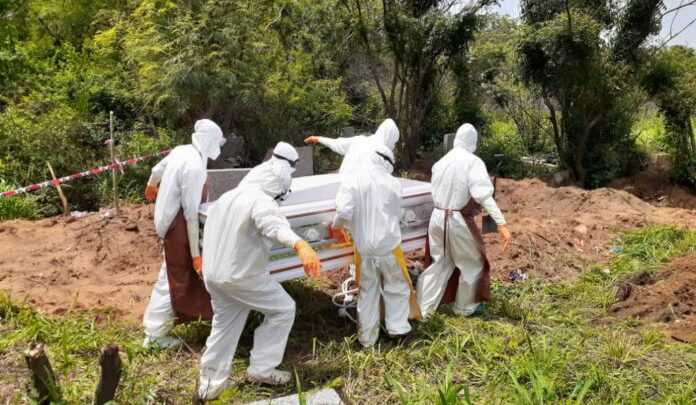While Covid-19 related deaths were not so widespread for the greater part of last year, prompting some doubting Thomases to dismiss the pandemic as not only alien to Africa but also a myth, the escalation in the fatalities in the past few weeks is proving many wrong.
Since the festive season, the country has been registering an increase in both Covid 19 cases and deaths.
For instance, from 12 to 14 January, 108 Zimbabweans succumbed to the pandemic.
In a development that shows the second wave of the pandemic is more deadly than the first, on January 18 alone, an unprecedented 60 people died of the disease bringing to 773 the total number of lives that have succumbed to pandemic since March last year.
Zimbabwe has to date recorded a cumulative total of 27, 892 Covid-19 cases of which 9, 747 are active cases while recoveries stand at 17, 372.
“The (Covid-19 death) statistics are becoming scarier and scarier with each passing day,” bemoaned Linda Mpofu, a Gwanda resident.
“What is also worrying is the fact that these stats are not just numbers anymore but names of people we know. The government together with citizens should start being careful and take measures to control the spread.”
She said it was unfortunate that there were people who still believed Covid-19 was a myth.
“Sadly, there is absolutely nothing we can do to such people,” she lamented.
“Sometimes one may wish that they become directly affected so that they may see that Covid-19 is real.”
Mpofu said it was high time individual Zimbabweans jealously guarded their health by taking all the recommended precautionary measures against the pandemic.
“People should start treating each other as positive cases. While a lockdown is a good idea, the government should make sure that they put up mechanisms such that people do not die from hunger while locked at home.”
A Bulawayo resident, Mbonisi Gumbo, blamed the increase in Covid-19 related deaths on the influx of returning citizens from neighbouring countries during the festive season.
“It’s a very worrying scenario, and I believe the government did not well handle the influx of returning residents from outside the country during the festive season,” he told CITE.
Gumbo said he was of the idea that there has not been a massive programme to teach people about the pandemic and taking preventative measures.
He said people who still believed the pandemic was a myth were entirely not to blame.
“I don’t really blame the ordinary people for saying or believing this because of the conspiracy theories making rounds on social media and the inconsistencies on the part of the responsible officials whether local and international,” he said.
“If we have ministers and presidents who don’t believe that the pandemic is real we can’t blame the ordinary people.”
He said to prevent further deaths, the government must procure vaccines for the people.
“For a start, I want to state that the government must find other means including vaccines because the lockdown restrictions alone are not sustainable,” he said.
“People have not been getting any assistance while at home.”
Another resident of Bulawayo, Sipho Nyoni, said if the government was serious about combating Covid-19, it should have taken serious action in time to limit people movements during the festive season.
“If indeed Covid-19 is real and is a pandemic, action was supposed to be taken early on limiting movements during the festive period,” he said.
“We were supposed to close our border with South Africa, as this is where a strain or Covid variant which spreads faster we are told, is emanating from.”
He, like Gumbo also said people who consider the pandemic a myth were not to blame, adding the manner in which authorities have handled the pandemic, was causing them to think so.
“With or without Covid-19, investment in our health sector has become the most critical thing,” he said.
“A large chunk of our budget needs to be allocated to our health ministry. Lockdowns are only political instruments of control and unproven when it comes to control of this disease.”

